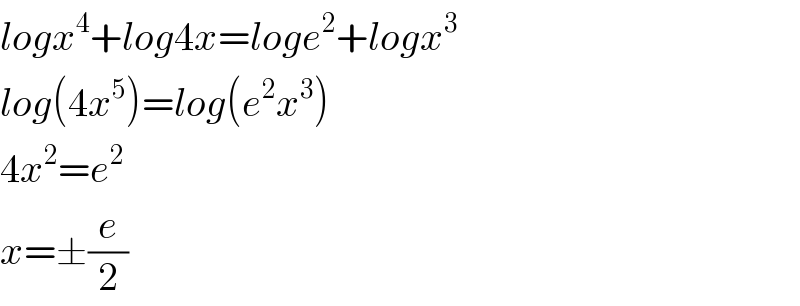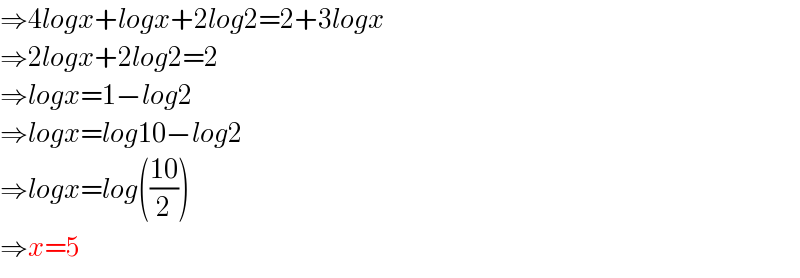
Question Number 109018 by mathdave last updated on 20/Aug/20

Answered by Aziztisffola last updated on 20/Aug/20

$$\:\mathrm{ln}\left(\mathrm{x}^{\mathrm{4}} \right)+\mathrm{ln}\left(\mathrm{4x}\right)=\mathrm{2}+\mathrm{ln}\left(\mathrm{x}^{\mathrm{3}} \right) \\ $$$$\:\mathrm{4ln}\left(\mathrm{x}\right)+\mathrm{ln}\left(\mathrm{x}\right)+\mathrm{ln}\left(\mathrm{4}\right)=\mathrm{2}+\mathrm{3ln}\left(\mathrm{x}\right) \\ $$$$\:\mathrm{5ln}\left(\mathrm{x}\right)+\mathrm{2ln}\left(\mathrm{2}\right)=\mathrm{2}+\mathrm{3ln}\left(\mathrm{x}\right) \\ $$$$\:\mathrm{2ln}\left(\mathrm{x}\right)=\mathrm{2}−\mathrm{2ln}\left(\mathrm{2}\right) \\ $$$$\:\mathrm{ln}\left(\mathrm{x}\right)=\mathrm{1}−\mathrm{ln}\left(\mathrm{2}\right) \\ $$$$\:\mathrm{x}=\mathrm{e}^{\mathrm{1}−\mathrm{ln}\left(\mathrm{2}\right)} \\ $$$$ \\ $$
Answered by Dwaipayan Shikari last updated on 20/Aug/20

$${logx}^{\mathrm{4}} +{log}\mathrm{4}{x}={loge}^{\mathrm{2}} +{logx}^{\mathrm{3}} \\ $$$${log}\left(\mathrm{4}{x}^{\mathrm{5}} \right)={log}\left({e}^{\mathrm{2}} {x}^{\mathrm{3}} \right) \\ $$$$\mathrm{4}{x}^{\mathrm{2}} ={e}^{\mathrm{2}} \\ $$$${x}=\pm\frac{{e}}{\mathrm{2}} \\ $$
Commented by Olaf last updated on 20/Aug/20

$${x}\:=\:+\frac{{e}}{\mathrm{2}} \\ $$$$\left({x}\:{cannot}\:{be}\:{negative}\right. \\ $$$$\left.{otherwise}\:{log}\mathrm{4}{x}\:{does}\:{not}\:{exist}\right) \\ $$
Commented by Dwaipayan Shikari last updated on 20/Aug/20

$${But}\:{also} \\ $$$${log}\left(−\mathrm{2}{e}\right)={log}\left(−\mathrm{1}\right)+{log}\mathrm{2}{e}=\pi{i}+{log}\mathrm{2}+\mathrm{1} \\ $$
Answered by nimnim last updated on 20/Aug/20

$$\Rightarrow\mathrm{4}{logx}+{logx}+\mathrm{2}{log}\mathrm{2}=\mathrm{2}+\mathrm{3}{logx} \\ $$$$\Rightarrow\mathrm{2}{logx}+\mathrm{2}{log}\mathrm{2}=\mathrm{2} \\ $$$$\Rightarrow{logx}=\mathrm{1}−{log}\mathrm{2} \\ $$$$\Rightarrow{logx}={log}\mathrm{10}−{log}\mathrm{2} \\ $$$$\Rightarrow{logx}={log}\left(\frac{\mathrm{10}}{\mathrm{2}}\right) \\ $$$$\Rightarrow{x}=\mathrm{5} \\ $$
Commented by JDamian last updated on 20/Aug/20
it's natural log, not decimal log. 1 = log(e) = ln (e) NOT log(10)
Commented by nimnim last updated on 20/Aug/20

$${How}\:{do}\:{you}\:{know}\:{that}\:{it}\:{is}\:{natural}\:{log}\:? \\ $$$$ \\ $$
Commented by nimnim last updated on 20/Aug/20

$${common}\:{logarithm}\left({base}\:\mathrm{10}\right)={logx} \\ $$$${natural}\:{logarithm}\left({base}\:{e}\right)={ln}\left({x}\right) \\ $$
